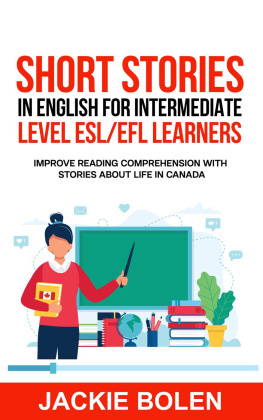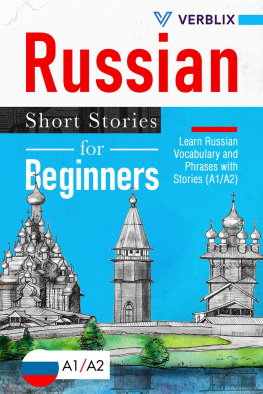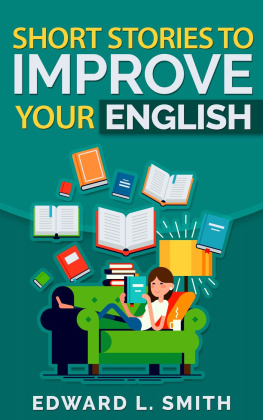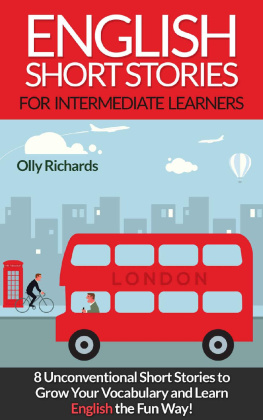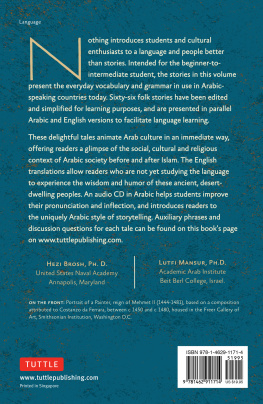ENGLISH SHORT STORIES
FOR INTERMEDIATE LEARNERS
100 ENGLISH SHORT STORIES TO IMPROVE YOUR VOCABULARY
AND LEAN ENGLISH THE FUN WAY
English Language And Culture Academy
Copyright 2018 by English Learner And Culture Academy - All rights reserved
License Notice
This document is geared towards providing exact and reliable information regarding the topic and issue covered. In no way is it legal to reproduce, duplicate, download, or transmit any part of this document in either electronic means or printed format without the consent of the author or publisher. Recording of this publication is strictly prohibited and any storage of this document is not allowed unless with written permission from the publisher.
All rights reserved
The information provided herein is stated to be truthful and consistent, in that any liability, in terms of inattention or otherwise, by any usage or abuse of any policies, processes, or directions contained within is the solitary and utter responsibility of the recipient reader. Under no circumstances will any legal responsibility or blame be held against the publisher or author for any reparation, damages, or monetary loss due to the information herein, either directly or indirectly. The information herein is offered for informational purposes solely and is universal as so. Any name and content in this book are fiction and not related to any real events or persons. The presentation of the information is without a contract or any type of guaranteed assurance.
Contents
Learning English Through Short Stories
Reading culturally interesting and entertaining short stories to enhance your English is an easy way to improve your English language skills. This book contains a selection of 100 short stories for beginners with a wide range of genres, all prepared specifically for English language learners. This book aims to teach different English vocabulary and phrases associated with short stories and to improve your English language skills in a short time. All stories are written by an English linguist and native speaker from England to ensure you can learn from authentic material while fine-tuning your English vocabulary and improving your comprehension.
The content is intended mainly for elementary to intermediate level learners, but it will also be useful for more advanced learners as a way of practicing their reading skills and comprehension of the English language. The stories have been arranged according to their degree of difficulty and each story is accompanied by a key vocabulary section and story-related questions.
Using this Book Effectively
For beginners it's probably more beneficial to glance through the story first and then read aloud. Then review the key-vocabulary section and reread the story once more or until you get a grasp of the story. Then carefully read the story at your own pace until you understand each sentence. Vocabulary will be introduced to you at a reasonable pace, so youre not overwhelmed with difficult words all at once. Here, you wont have to look up every other word, but you can simply enjoy the story and absorb new words simply from the storys context. To learn English effectively you just read each story at a time and study the vocabulary after reading. the English presented in this book is British English, although some of the stories are based on American English.
The English contained in this book is written using easy-to-understand grammar and vocabulary that both, those at the beginner and intermediate levels can understand, appreciate, and learn from. Some stories are focused on dialogue. These stories contain loads of natural dialogue, so you can learn conversational English as you read. This is doubly beneficial as you will improve your speaking ability as well. Over time, you will build an intuitive understanding of how English functions. This differs from a more theoretical understanding put together via learning rules and conceptual examples. Its more important to reach to finish the story without stopping than to understand every word. The simple truth is that you wont get everything your first time around. This is completely normal. Towards the end of this book you find the stories slightly longer and more complex, but still comprehensible for beginners.
1. The Key
I'm late today and I have to leave for work very quickly; I am jumping into my car . As I turn onto the freeway, I'm suddenly not sure if I took my door key with me. I'm touching my bag. "My God! I forgot my key, I say aloud .
I make a u-turn and drive back as fast as I can. I park my car right in front of my door, although its not normally where one is allowed to park or to stop a car. I live on the third floor and still run up the stairs hoping to get away with it . I'm looking for the key in my apartment but I can not find it right away. After a few minutes , I come to the realization: I had left the key in my jacket! I'm running downstairs back to the car. I'm looking around . Where's my car? In the distance I see a tow truck pulling my car off.
2. What is Culture?
I sit with several students in a caf in Paris.
We have an international meeting . Americans, French, and Germans sit at a table and discuss.
The American asks, " What does culture mean in this country?"
I say, "That term can mean a lot. Literature, theatre, art, or even the way we speak, including the way you conduct yourself ."
"Does it also include behavior ? " asks the American.
"Behavior in general terms, probably is a part of it," says the German.
"So that means when I behave I have culture," ask the American smiling.
"More or less, I reply. "But education and manners would also describe culture"
"Can one say in France as well that I have culture, and you do not?" asks the American.
"No, that would be arrogant ," I assert.
3. Food Poisoning
My brother Marc feels terrible; he's been in bed since yesterday . He has nausea, a headache, coughing, and diarrhea. He also feels exhausted . My father drives my brother to the doctor . He explains the conditions to the doctor and the doctor examines Marc. The doctor finds out that Marc has food poisoning . It's a dangerous situation because Marc is already dehydrated! The doctor also prescribes that Marc stay in bed and take strong medication twice a day. My brother believes his food poisoning comes from a kebab he had eaten the day before when he stopped downtown .
4. The Neighbor
My mother and I are watching our new neighbor . Every morning at eight o'clock he leaves his house. We're watching him from the kitchen window. The man is young and wears a suit and tie. We think he's a man of class. He is always coming and going at a particular time .
My mother also has many friends and often invites strange men into the house as well. The men are very friendly and often give my mother gifts. After their visits, we sometimes have a lot of cash on hand. Just when the men have left, we usually rush to the mall to go shopping . One day we meet the new neighbor in the supermarket. My mother smiles at the man. They start talking. The neighbor comes to our house and spends time with my mother. A month later, my mother says, "we're going to move soon. We will live with Jeff, our neighbor, I convinced him to let us live with him.
5. Headache
Mrs. Meyer has a severe headache . The doctor examines her shoulder and prescribes the woman's pills that she has to take every day . In addition, the doctor gives the woman a list of activities to do. She is supposed to do yoga and meditation regularly, as the doctor states that the headaches come from stress.
The woman does the activities for several days , but the headaches do not go away. After a week she goes back to the doctor.
Next page




